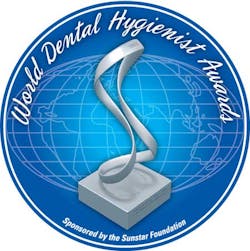Busy schedule of hygiene events continues as summer heats up
Be sure to read the Oral Cancer Cause article.(1) OCC's purpose is “to improve the quality of life for oral cancer patients through financial support so that they may face the world with peace and dignity during and after medical treatment.” There is a section for patients and one for professionals.
Part of this month’s newsletter is about “bugs," bacteria to be exact! Betsy Reynolds talks to us about a bug’s life, and her insightful, and always humorous presentation at RDH Under One Roof.
In other news about bugs, a new study by researchers at The University of Central Lancashire (UCLan) School of Medicine and Dentistry proposes that people with poor oral hygiene or periodontal disease may be at a greater risk of developing Alzheimer’s disease.(2) The research established the existence of products from Porphyromonas gingivalis in brains from patients suffering from dementia.
As we all know, this bacterium is linked to chronic periodontal disease. The bacteria enter the bloodstream through daily activities such as eating, chewing, tooth brushing. They can also become blood borne after invasive dental treatment, and hypothetically enter the brain.(3)
The researchers propose that whenever they reach the brain, the bacteria may trigger immune system responses by already “well-informed” brains cells, causing them to release more chemicals that kill neurons. This could be one mechanism that leads to changes in the brain, which is typical of Alzheimer’s disease, and could be responsible for causing symptoms such as confusion and deteriorating memory. They are working on the concept that when the brain is repeatedly exposed to bacteria and/or their debris from periodontal infection, subsequent immune responses may lead to nerve cell death and possibly memory loss.
Another alert warns us that oral ketoconazole should not be first choice for fungal infections.(4) The oral antifungal ketoconazole (marketed as Nizoral) should not be used as a first-line treatment for any fungal infection because it may pose a risk for adrenal gland problems and potentially fatal liver injury, the FDA notified clinicians late last week. Additionally, interactions with other drugs — including dofetilide, quinidine, pimozide, and cisapride — could cause heart rhythm problems.
Ketoconazole's label will now note that the tablets: are no longer indicated for Candida and dermatophyte infections or for skin and nail infections; should not be used in patients with acute or chronic liver disease; and should only be used to treat endemic mycoses infections when patients don't respond to or can't tolerate other antifungal therapies. See the full prescribing information for further details.(5) In the dental office, we often see fungal infections in immunocompromised patients, such as those with diabetes, cancer or HIV/AIDS.
For a fact sheet on Fungal infection of the mouth in people who have cancer or HIV/AIDS, see the NIH website.(6)
And last, but not least, acetaminophen has been linked to rare, serious, potentially fatal skin reactions, including Stevens-Johnson syndrome, toxic epidermal necrolysis, and acute generalized exanthematous pustulosis.(7)
Patients taking acetaminophen or another pain reliever/fever reducer who develop skin rashes or reactions should stop taking the drug and seek immediate medical attention. Patients who have experienced these reactions in the past while taking acetaminophen should not take the drug again and should discuss alternatives with their healthcare provider. The warning is based on a small number of published cases and the FDA's own adverse event reporting system.
Dagmar Else Slot, RDH, MSc., (left) and Mário Araújo, RDH, BSDH, M. Psych
Enjoy the rest of the summer!!
References
1. http://oralcancercause.org/.
2. Poole S, Singhrao SK, Kesavalu L, Curtis MA, and Crean SJ. Determining the presence of periodontopathic virulence factors in short-term postmortem Alzheimer’s disease brain tissue. Journal of Alzheimer’s Disease, Friday, May 10, 2013.
3. Poor dental health may lead to Alzheimer’s. Journal of Alzheimer’s Disease. http://www.j-alz.com/node/304.
4. http://www.fda.gov/Safety/MedWatch/SafetyInformation/SafetyAlertsforHumanMedicalProducts/ucm362672.htm.
5. http://www.accessdata.fda.gov/drugsatfda_docs/label/2013/018533s040lbl.pdf.
6. http://www.ncbi.nlm.nih.gov/pubmedhealth/PMH0046251/.
7. http://www.fda.gov/Drugs/DrugSafety/ucm363041.htm.
8. http://sunstarawards.com/World_Dental.html.
Sincerely,
Maria Perno Goldie, RDH, MS
To read previous RDH eVillage FOCUS introductions by Maria Perno Goldie, go to introductions.
To read more about ISDH, click here.







